一般过去时时态
英语一般过去时和过去进行时
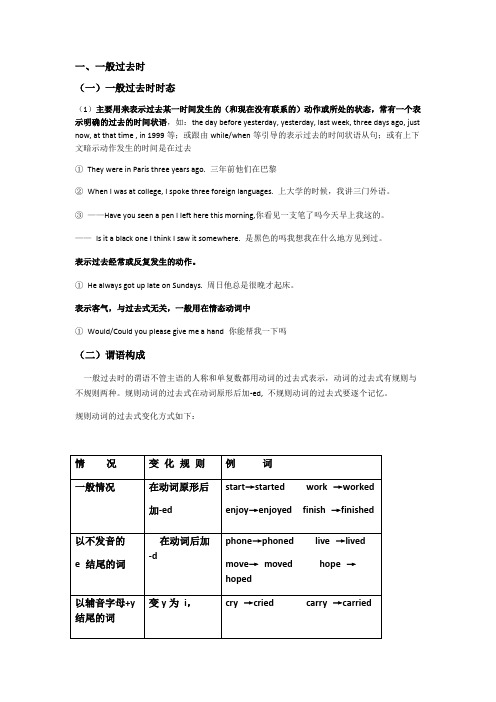
一、一般过去时(一)一般过去时时态(1)主要用来表示过去某一时间发生的(和现在没有联系的)动作或所处的状态,常有一个表示明确的过去的时间状语,如:the day before yesterday, yesterday, last week, three days ago, just now, at that time , in 1999等;或跟由while/when等引导的表示过去的时间状语从句;或有上下文暗示动作发生的时间是在过去①They were in Paris three years ago. 三年前他们在巴黎②When I was at college, I spoke three foreign languages. 上大学的时候,我讲三门外语。
③——Have you seen a pen I left here this morning,你看见一支笔了吗今天早上我这的。
——Is it a black one I think I saw it somewhere. 是黑色的吗我想我在什么地方见到过。
表示过去经常或反复发生的动作。
①He always got up late on Sundays. 周日他总是很晚才起床。
表示客气,与过去式无关,一般用在情态动词中①Would/Could you please give me a hand 你能帮我一下吗(二)谓语构成一般过去时的谓语不管主语的人称和单复数都用动词的过去式表示,动词的过去式有规则与不规则两种。
规则动词的过去式在动词原形后加-ed, 不规则动词的过去式要逐个记忆。
规则动词的过去式变化方式如下:不规则动词的过去式(举例)begin →began go →went see →saw do →did get →got come →came leave →left am →was are →were give →gave have →had think →thought一般过去时的否定式和疑问式(1)实义动词的一般过去时的否定式和疑问式要用助动词did帮助构成。
一般过去时态的变化规则
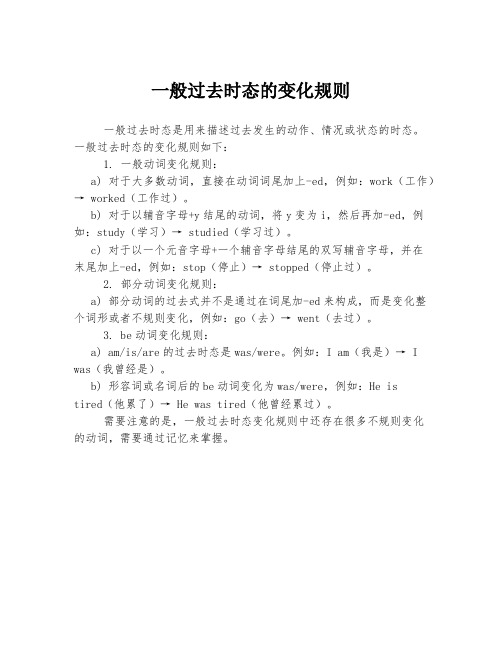
一般过去时态的变化规则
一般过去时态是用来描述过去发生的动作、情况或状态的时态。
一般过去时态的变化规则如下:
1. 一般动词变化规则:
a) 对于大多数动词,直接在动词词尾加上-ed,例如:work(工作)→ worked(工作过)。
b) 对于以辅音字母+y结尾的动词,将y变为i,然后再加-ed,例如:study(学习)→ studied(学习过)。
c) 对于以一个元音字母+一个辅音字母结尾的双写辅音字母,并在
末尾加上-ed,例如:stop(停止)→ stopped(停止过)。
2. 部分动词变化规则:
a) 部分动词的过去式并不是通过在词尾加-ed来构成,而是变化整个词形或者不规则变化,例如:go(去)→ went(去过)。
3. be动词变化规则:
a) am/is/are的过去时态是was/were。
例如:I am(我是)→ I was(我曾经是)。
b) 形容词或名词后的be动词变化为was/were,例如:He is
tired(他累了)→ He was tired(他曾经累过)。
需要注意的是,一般过去时态变化规则中还存在很多不规则变化
的动词,需要通过记忆来掌握。
一般过去时态的结构及用法

一般过去时态的结构及用法一般过去时是英语中用来描述已经发生或已经完成的动作、状态或事件的时态。
它常用于叙述过去的经历、故事或历史事件。
一般过去时态的结构基本上由一个动词的过去式构成,而且不需要使用助动词来表示时间。
以下是一般过去时的结构及用法的相关参考内容:一、结构:1. 肯定句结构:主语 + 动词过去式 + 其他成分例句:I studied English last night.2. 否定句结构:主语 + 动词过去式 + not + 其他成分例句:She did not go to the party.3. 疑问句结构:助动词 (did) + 主语 + 动词原形 + 其他成分 + ?例句:Did they watch the movie?二、用法:1. 表示过去的经历或事件:例句:I visited my grandparents last summer.We went to the beach yesterday.2. 表示过去的习惯或状态:例句:He used to smoke, but he quit last year.We lived in London for ten years.3. 在时间状语从句中:例句:I saw her while I was walking home.He was cooking dinner when the phone rang.4. 与过去的比较或对比:例句:She was much taller when she was young.It was colder last winter than this winter.5. 与现在进行时态的对比:一般过去时表示的是过去的动作或状态,而现在进行时表示的是现在正在进行的动作或状态。
例句:Last night, I studied for the exam. (过去发生的动作)Right now, I am studying for the exam. (现在正在进行的动作)6. 与过去进行时态的对比:一般过去时表示的是过去的动作或状态,而过去进行时表示的是过去某个时间点正在进行的动作。
一般过去时时态
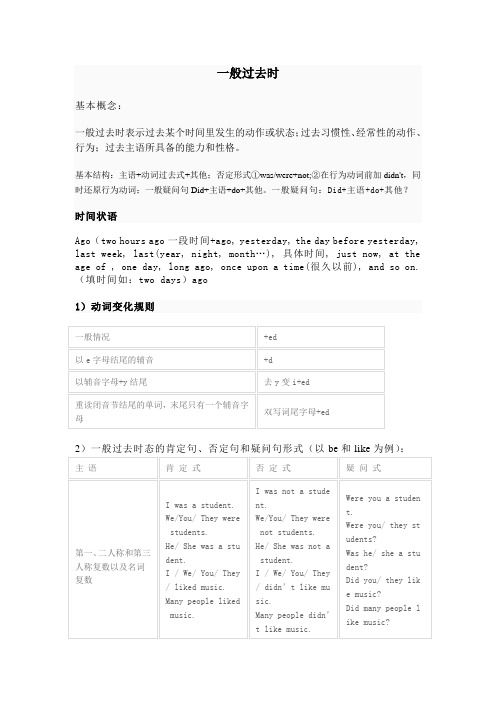
一般过去时基本概念:一般过去时表示过去某个时间里发生的动作或状态;过去习惯性、经常性的动作、行为;过去主语所具备的能力和性格。
基本结构:主语+动词过去式+其他;否定形式①was/were+not;②在行为动词前加didn't,同时还原行为动词;一般疑问句Did+主语+do+其他。
一般疑问句:Did+主语+do+其他?时间状语Ago(two hours ago一段时间+ago, yesterday, the day before yesterday, last week, last(year, n ight, month…), 具体时间, just now, at the age of , one day, long ago, once upon a time(很久以前), and so on.(填时间如:two days)ago1)动词变化规则2)一般过去时态的肯定句、否定句和疑问句形式(以be和like为例):3)一般过去时的用法:1.过去发生的动作。
例如:The police stopped me on my way home last night.2.过去存在的状态。
例如:They weren't able to come because they were so busy.3. 常用于一般过去时的时间状语:yesterday,three months ago,last year,in 1979,often,always 例题解析:举一反三,学的更轻松!1. r. Mott is out. But he ______ here a few minutes ago.A. wasB. isC. will beD. would be解析:时分钟前发生的动作,应该用一般过去时。
应选 A,2.---Hi, Tom.---Hello, Fancy. I ______ you were here.A.don't knowB.won't thinkC. thinkD. didn't know解析:虽然句中没有明确的时间状语,但是可以通过上下文语境判断出,我说这话之前不知道,但是现在知道了,表示过去的动作,要用过去时态。
时态三、一般过去时
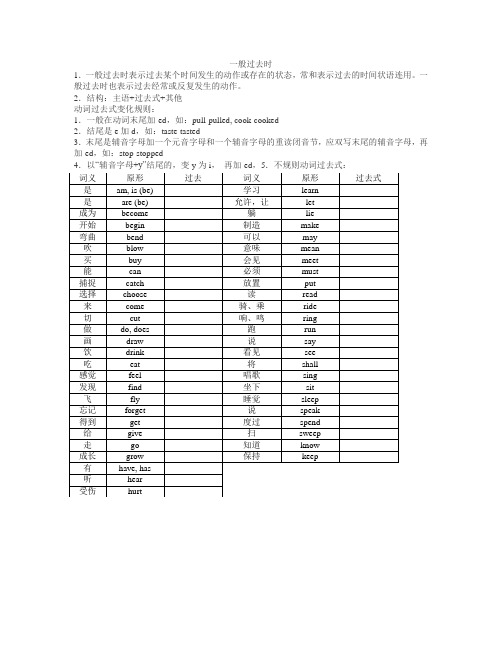
一般过去时1.一般过去时表示过去某个时间发生的动作或存在的状态,常和表示过去的时间状语连用。
一般过去时也表示过去经常或反复发生的动作。
2.结构:主语+过去式+其他动词过去式变化规则:1.一般在动词末尾加-ed,如:pull-pulled, cook-cooked2.结尾是e加d,如:taste-tasted3.末尾是辅音字母加一个元音字母和一个辅音字母的重读闭音节,应双写末尾的辅音字母,再加-ed,如:stop-stopped4.以“辅音字母+y”结尾的,变y为i,再加-ed,5.不规则动词过去式:三、句型转换:一般过去式看动词,动词必须用过去式,变一般疑问句先找be 和情态动词,若有提前并大写,若无借助于did,实义动词要还原。
变否定句先找be 和情态动词,若有再后加not,若无借助于didn’t,实义动词要还原。
特殊疑问句由疑问词+一般疑问句构成。
四、标志词:1. yesterday、last+时间、时间+ago、just now、in+过去的时间一、单项选择:从下列各题后所给的四个选项中选择最佳答案填空。
(10)( )1.My father______ill yesterday.A.isn't B.aren't C.wasn't D.weren't( )2.______your parents at home last week﹖A.Is B.Was C.Are D.Were( )3.The twins______in Dalian last year.They______here now.A.are; were B.were; are C.was; are D.were; was ( )4.______your father at work the day_____yesterday(前天)﹖A.Was; before B.Is; before C.Was; after D.Is; after ( )5.—Who was on duty last Friday﹖—______.A.I am B.I was C.Y es, I was D.No, I wasn't ( )6. I cleaned my classroom ___________.A with three hoursB three hours agoC in three hoursD three hours before( ) 7. I came _______ my house two days ago .A back onB back toC to backD back( ) 8 . ___________? He did some reading at home.A What does your father do yesterday eveningB What does your brother do in the schoolC What did your brother do over the weekendD Where did your brother go last Sunday( ) 9. What did you do ________ ? I went to the movies.A next morning Bover the weekend C in the weekend D next Monday( ) 10. The koala sleeps _______,but gets up _________.A during the day; at the eveningB at day ;during nightC in the day ;during the eveningD during the day ; at night二、请用正确动词形式填空。
(完整版)英语一般过去时和过去进行时
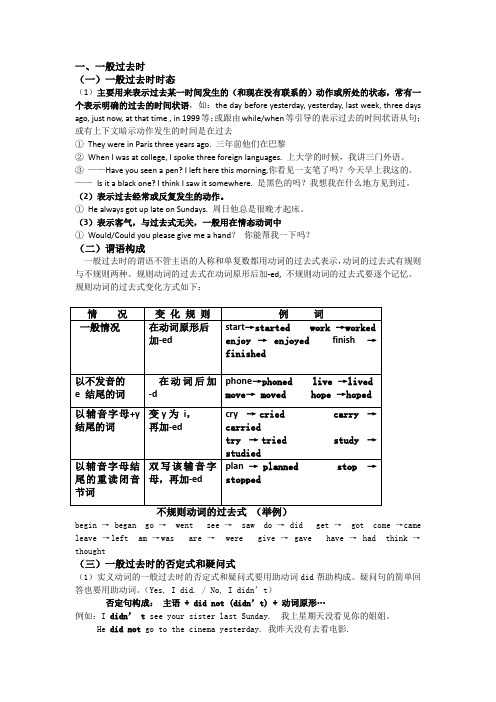
一、一般过去时(一)一般过去时时态(1)主要用来表示过去某一时间发生的(和现在没有联系的)动作或所处的状态,常有一个表示明确的过去的时间状语,如:the day before yesterday, yesterday, last week, three days ago, just now, at that time , in 1999等;或跟由while/when等引导的表示过去的时间状语从句;或有上下文暗示动作发生的时间是在过去①They were in Paris three years ago. 三年前他们在巴黎②When I was at college, I spoke three foreign languages. 上大学的时候,我讲三门外语。
③——Have you seen a pen? I left here this morning,你看见一支笔了吗?今天早上我这的。
——Is it a black one? I think I saw it somewhere. 是黑色的吗?我想我在什么地方见到过。
(2)表示过去经常或反复发生的动作。
①He always got up late on Sundays. 周日他总是很晚才起床。
(3)表示客气,与过去式无关,一般用在情态动词中①Would/Could you please give me a hand?你能帮我一下吗?(二)谓语构成一般过去时的谓语不管主语的人称和单复数都用动词的过去式表示,动词的过去式有规则与不规则两种。
规则动词的过去式在动词原形后加-ed, 不规则动词的过去式要逐个记忆。
规则动词的过去式变化方式如下:begin → began go → went see → saw do → did get → got come →came leave →left am →was are → were give → gave have → had think →thought(三)一般过去时的否定式和疑问式(1)实义动词的一般过去时的否定式和疑问式要用助动词did帮助构成。
英语时态:一般过去时

英语时态:一般过去时一、定义一般过去时可表示过去某个时间里发生的动作、事情或存在的状态;也可表示过去习惯性、经常性的动作、行为;或表示过去主语所具备的能力、性格。
一般过去时动作发生的时间是“过去”,动作的状态是“一般”。
(注:“一般”态表示的是“动作经常发生或频繁发生”。
)二、时间状语一般过去时常和表示过去某一时间的状语连用,主要包括:yesterday,yesterday morning/afternoon/evening昨天,昨天早上/下午/晚上last night/week/month/year昨晚/上周/上个月/去年the night/week/month/year before last前天夜里/上上个星期/上上个月/前年two minutes/hours/days/weeks/months/years ago两分钟/小时/天/周/月/年前one morning/afternoon/evening在某一早上/下午/晚上that morning/afternoon/evening/day/week/month/summer/year那个早上/那个下午/那个晚上/那天/那周/那个月/那个夏天/那一年just now,at that time,in1990...刚才,当时/在那时,在1990年...三、动词形式一般过去时的动词需用过去式。
动词过去式的构成规则主要包括以下几种:(1)规则动词,在动词原形后直接加ed。
发音规则:在以浊辅音或元音结尾的词后发音/d/,以清辅音结尾的词后发音/t/,以t 或d结尾的词后发音/id/。
示例:ask-asked/t/climb-climbed/d/open-opened/d/pass-passed/t/want-wanted/id/need-needed/id/(2)动词以不发音的e结尾,则只在词尾加d。
发音规则:在以浊辅音或元音结尾的词后发音/d/,以清辅音结尾的词后发音/t/,以t 或d结尾的词后发音/id/。
小学一般过去时态
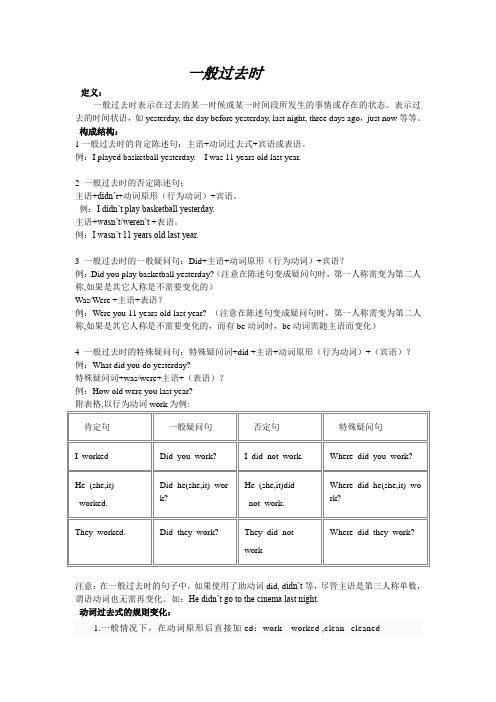
一般过去时定义:一般过去时表示在过去的某一时候或某一时间段所发生的事情或存在的状态。
表示过去的时间状语,如yesterday, the day before yesterday, last night, three days ago,just now等等。
构成结构:1一般过去时的肯定陈述句:主语+动词过去式+宾语或表语。
例:I played basketball yesterday. I was 11 years old last year.2 一般过去时的否定陈述句:主语+didn’t+动词原形(行为动词)+宾语。
例:I didn’t play basketball yesterday.主语+wasn’t/weren’t +表语。
例:I wasn’t 11 years old last year.3 一般过去时的一般疑问句:Did+主语+动词原形(行为动词)+宾语?例:Did you play basketball yesterday?(注意在陈述句变成疑问句时,第一人称需变为第二人称,如果是其它人称是不需要变化的)Was/Were +主语+表语?例:Were you 11 years old last year? (注意在陈述句变成疑问句时,第一人称需变为第二人称,如果是其它人称是不需要变化的,而有be动词时,be动词需随主语而变化)4 一般过去时的特殊疑问句:特殊疑问词+did +主语+动词原形(行为动词)+(宾语)?例:What did you do yesterday?特殊疑问词+was/were+主语+(表语)?例:How old were you last year?注意:在一般过去时的句子中,如果使用了助动词did, d idn’t等,尽管主语是第三人称单数,谓语动词也无需再变化。
如:He didn’t go to the cinema last night.动词过去式的规则变化:1.一般情况下,在动词原形后直接加ed:work-- worked ,clean--cleaned2.以不发音的e结尾的词,直接加d:live --lived3 以辅音字母+y结尾的词,变y为i加ed:study--studied4以元音字母+y结尾的词,直接加ed:enjoy--enjoyed ,play--played5 以重读闭音节(辅音+元音+辅音)结尾的词,双写最后的辅音字母+ed:stop--stopped不过许多常用的动词的过去式的变化都是不规则的,这就需要大家花时间逐个去记:have/has -- had,eat--ate, see—saw,am/is—was, are—were, go—went, do—did, take--took, run--ran, lend--lent, sleep--slept,get—got, meet—met, bring—brought, buy—bought, think—thought, say—said,give—gave, put—put, speak—spoke, teach—taught,write—wrote, wake—woke, fall—fell, know—knew等等同步测试:一、写出下列动词的过去式。
- 1、下载文档前请自行甄别文档内容的完整性,平台不提供额外的编辑、内容补充、找答案等附加服务。
- 2、"仅部分预览"的文档,不可在线预览部分如存在完整性等问题,可反馈申请退款(可完整预览的文档不适用该条件!)。
- 3、如文档侵犯您的权益,请联系客服反馈,我们会尽快为您处理(人工客服工作时间:9:00-18:30)。
一般过去时
班级姓名
一般过去时的功能:
一般过去时表示过去某个时间发生的动作或存在的状态,常和表示过去的时间状语连用。
一般过去时也表示过去经常或反复发生的动作。
一般过去时的构成:
1.be动词:主语+be动词过去式(was, were)+其它。
e.g:I was a student twenty years ago.
注意:在一般过去时中主语单数be动词用was, 主语复数be动词用were。
2.行为动词:主语+行为动词过去式(+其它)。
e.g:We watched TV last night.。
一般过去时标志用语
Just now, a moment ago, …ago, yesterday, last…,on Sunday中文“了”
动词过去式的变化规则
1.一般情况下,直接加-ed,如:pull-pulled, cook-cooked
2.以e结尾只加d,如:taste-tasted
3.以“辅音字母+y”结尾,变y为i, 再加-ed,如:study-studied
4. 双写末尾的辅音字母,再加-ed,如:stop-stopped
5.不规则的单独记
练习:
一、写出下列动词的过去式
am/is are study play go
have/has meet do/does sing eat
make read see sit tell
二、用be动词的适当形式填空
1.They _______ glad to see each other last month.
2.He ________ at the camp last week.
3.I _____ an English teacher, but I _______ a middle schoolstudent twenty
years ago.
4.Yang Ling ________ eleven years old last year.
5.There ________ a lot of milk in the glass ten minutes ago.
6.There ________an apple on the plate yesterday.
7.There ________ some cakes in the fridge on Sunday.
8.Today _______ the second of June. Yesterday ______ the first of June. It
_____ Children's Day. All the students ______ very excited.
二、用所给词的适当形式填空
1. We often___________(play) in the playgound.
2. He _________(see) a play last Friday.
3. What (do) he usually (do) after school?
4. Danny (study) English,Chinese,Maths, Science and Art at school.
5. The sign on the grass (mean)‘Keep off the grass’.
6. ________ Mike________(read) English every day?
7. Did you (fly) kites? No, I (make) a kite.
8. Where you a moment ago? I in the bedroom. (be)
9. We _______ (have) a party last Halloween.
10. __ they _____ (play) chess in the classroom last PE lesson?
11. My parents didn’t ________ (work) last Friday.
12、I ________ (not taste) oranges on the farm yesterday.
三、中译英
1. 我们上周五看了一部电影。
We _____________ a film ____________ _______________.
2. 他做作业了吗?是的。
______ he _________ his homework? Yes, he ____.
3. 你们上个儿童节做了什么?我们参加了一个歌咏比赛,唱了一首英语歌。
--What _____ you _____ last ________ ________?
--We ______ a singing contest and an English song.
4. 你上周在哪儿?在家。
Where _________ you ______ _________? I _________ at home.
5. 他的朋友在浇花。
His friend ______ _________ flowers.
6. 去年春节我们没去拜访亲友,我们去北京了。
We ______ _____ relatives and friends last _____ Festival,we to Beijing.
7. 他在音乐会上演奏了吗?不,没有。
______ he ______ _______ the concert? No, he _______.
8.他经常饭后去散步,但昨晚下雨,他没去散步。
He often for a walk after supper. But it last night, so he did n’t a walk.
四、句型转换
Tom milked cows on the farm two days ago.
改一般疑问句
改否定句
对milked cows 提问
对on the farm提问
对two days ago提问。
